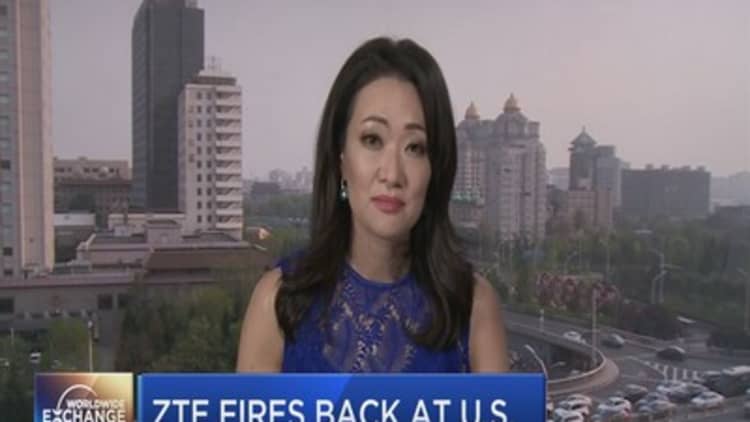
China's ZTE said Friday that a U.S. ban on exports to the technology firm could threaten its survival and adversely affect American companies.
Earlier this week, the Department of Commerce's Bureau of Industry and Security (BIS) imposed what's known as a denial of export privileges against ZTE. This means that U.S. firms cannot provide components or software to the Chinese giant.
It uses components from Qualcomm and software from Google for example in its smartphones.
"The Denial Order will not only severely impact the survival and development of ZTE, but will also cause damages to all partners of ZTE including a large number of U.S. companies," ZTE said in a statement on Friday.
"In any case, ZTE will not give up its efforts to resolve the issue through communication, and we are also determined, if necessary, to take judicial measures to protect the legal rights and interests of our company, our employees and our shareholders, and to fulfill obligations and take responsibilities to our global customers, end users, partners and suppliers."
In 2017, ZTE admitted to illegally shipping telecoms equipment to Iran and North Korea and agreed to pay $1.19 billion in penalties. But the U.S. said that in 2016 while the investigation was ongoing, ZTE made "false statements" to the BIS in regards to reprimanding employees involved.
At a press briefing in its Shenzhen headquarters, Chairman Yin Yimin admitted to wrongdoing but said the punishment didn't fit the crime.
"Such sanctions could put the company immediately into a coma," he said. "We resolutely oppose such an unfair, unreasonable punishment, and especially the act of politicizing trade issues."
ZTE said however that it has taken measures against employees who may have been responsible for the incident. It also said that it has introduced compliance training and in 2017 alone, spent over $50 million in an export control compliance program.
"It is unacceptable that BIS insists on unfairly imposing the most severe penalty on ZTE even before the completion of investigation of facts, ignoring the continuous diligent work of ZTE and the progress we have made on export compliance," the company said.
The ZTE episode risks escalating the trade spat between the U.S. and China. Both countries have threatened each other with billions of dollars of tariffs but technology has been a particular area of contention.
People in China have been shaken up by the case and a potential trade war with the U.S.
"From this, I learned how big a gap there is between China and the U.S. in tech development," a social media user by the name of Applemai said.
Another user called GuYueJunChi said: "Only when you have high-tech can you have a say."
Huawei, the world's third-largest smartphone player by market share, recently had a deal with AT&T to sell its flagship device in the U.S. fall through. Top U.S. intelligence chiefs then warned people not to buy Huawei phones. Huawei's consumer business chief told CNBC in February that its rivals were worried that the Chinese firm was getting too strong and playing politics to keep it out of the U.S. market.



